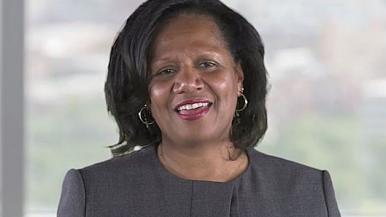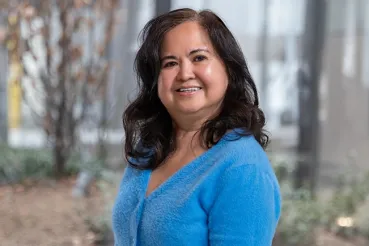Chief nursing officer discusses nurses’ role in care
By Kevin McKeough
The importance of nurses in providing health care is growing steadily, as they assume larger and more complex responsibilities for patients before, during and after hospitalization. More than 3,000 nurses work at Rush University Medical Center, and their contributions to the quality of care at Rush is evident in the four consecutive times the Medical Center has received Magnet status, the highest recognition given for nursing excellence. Since May 6-12 is National Nurses Week, it’s an ideal time to hear from Angelique Richard, RN, PhD, Rush’s new chief nursing officer, about what makes Rush nurses special, how the profession is changing and the core principles and rewards that have remained the same.
What do you love about the nursing profession?
Richard: We have such a privilege to care for patients and families and communities at their most vulnerable, many times at a crisis in their life. We are allowed to meet them at that point and their families and to help, both clinically as well as emotionally, through one of the roughest times in their life generally.
What qualities characterize Rush nurses or set them apart?
What makes a nurse a quality top nurse is strong knowledge, current knowledge of the clinical area that they are functioning in, passion about their patients, their families, the communities that they serve, and a commitment to the advancement of our profession as a whole. I think that is what makes Rush nurses unique and sets them apart, because they excel in all of those areas, 100-plus percent of the time.
Generally speaking what is the role of nurses at an academic medical center like Rush?
Nurses at the bedside are very much involved in understanding their patients from a holistic perspective. It starts with the assessment of that patient and the partnership with the care team in developing what that plan of care is going to be, and includes executing many aspects of that plan of care, educating patients and families about not only what they’re there for, but how to care for themselves once they leave us. It’s everything from just getting to know that patient and conducting that assessment and re-evaluating the plan of care. It includes all aspects of the care for that patient and then ensuring that when they do leave us that they’re educated and knowledgeable about how to care for themselves and that there is a smooth transition to the next level of care whatever that might be.
You started your nursing career here 30 years ago. How did Rush influence your work as a nurse?
I truly believe and attribute my career and the contributions that I’ve made to this organization and to many of the just extraordinary clinicians and professors that I had the privilege of learning from. I got my bachelor’s and my master’s degree from the Rush College of Nursing and my first job as a new grad was in the oncology and bone marrow transplant unit here. Though I left for many, many years, I carried those standards of nursing practice with me and in many ways tried to emulate those.
How has the nursing profession changed since you began your career?
I think health care in general has changed significantly over the many years from when I started my career here, but the core of nursing has remained the same, and I’m so glad it has. The unchanging core within nursing here at Rush has everything to do with a strong knowledge base, clinical expertise. Those have been very stable and consistent across the legacy of nursing at Rush and remain a primary core today.
I’m glad that at the core we have maintained those values and that commitment to the profession and to our nurses. I think it has better equipped them to be able to respond in kind to the changes that have occurred in health care today.
The way nurses use their expertise has changed over the years though. Can you talk a little bit about the different kinds of roles that nurses can perform today, particularly some of the specialty nursing areas?
One of the things that we have seen recently has been really an explosion of advanced practice nurses, certainly here and throughout the country. We have many nurses who go beyond our walls into ambulatory care and to the community and have made and continue to make a real impact on keeping patients and families and communities healthy, with the goal of them not having to come to the hospital.
Tell us a little more about advanced practice nurses. Who are they, and why are they becoming increasingly prominent in the nursing profession?
Advanced practice nurses have a higher level of education and training and expertise in a particular area of focus or clinical area of expertise. One of the reasons why we’ve seen such an explosion in advanced practice nurses has been with the changes that have occurred within what we call population health (a focus on the health of an entire population group) and a real focus on community and keeping our communities healthier. There’s been a greater need for providers who have the clinical expertise to function in that way.
One of the things that nurses do extremely well is the coordination of care and the education of patients and their families and communities. The changes that have occurred in health care has afforded this very high level nurse the ability to make an impact on the health of our communities.
What are your responsibilities as chief nursing officer?
As chief nursing officer, I have the privilege of working for all 3,000 nurses that are here at Rush. Because I am a Rush nurse and was born and bred here, I understand the privilege as well as the incredible responsibility that exists. We have such a strong nursing body here that they make my job easy. They’re engaged, they’re vocal, they’re active.
My role is to ensure that the voice of nursing is at a senior level of the organization. We have one of the longest-standing shared governance models in the country, well over 30 years. Shared governance is about nurses at every level of the organization having a voice in their practice. So my role is to ensure that that happens, that we are advancing nursing practice and that they have the resources that they need in order to provide the extraordinary care that they provide our patients every day.
Since it’s Nurses Week, do you want to say something in appreciation of your colleagues and other nurses?
Happy Nurses’ Week. It’s our week. I want to express my sincere gratitude and appreciation for the extraordinary care that you provide our patients and families and communities every day. I could not have more of a privilege than to serve you, and on behalf of all of your patients and families and the entire Rush family, thank you.




